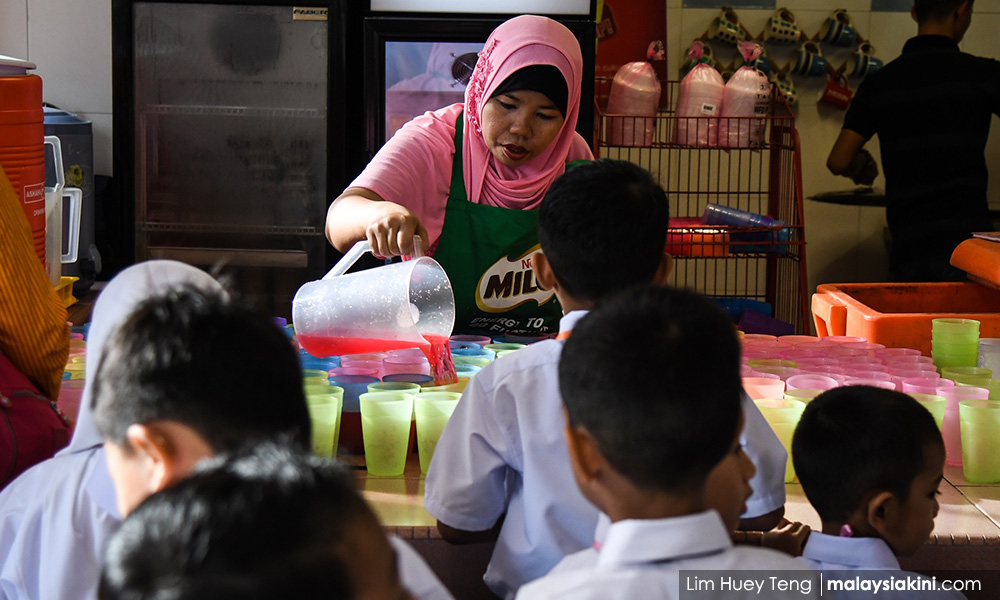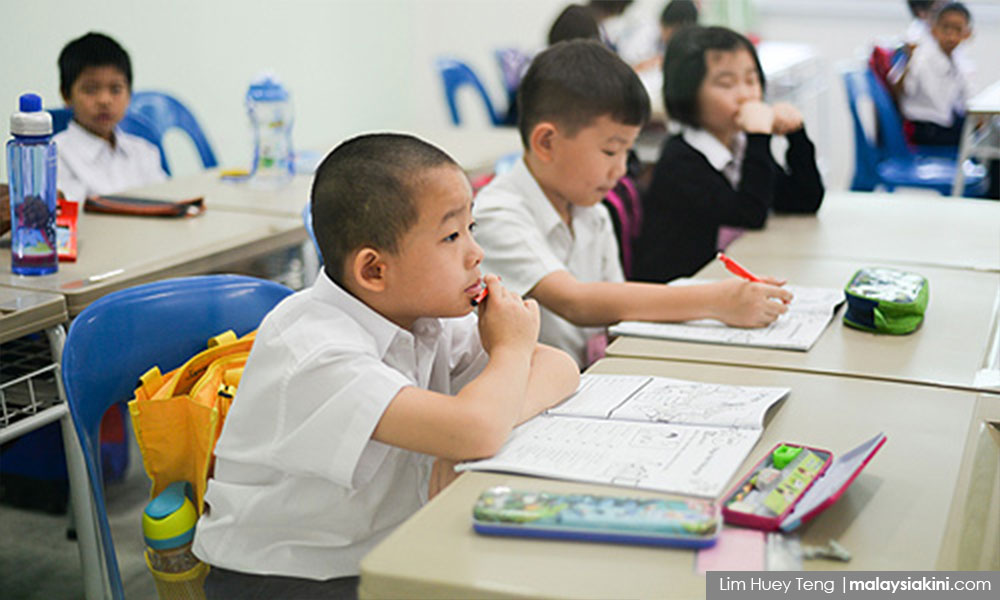Education Minister Fadhlina Sidek is under attack by certain quarters who are unhappy that she forbade the use of the word kafir (infidel) by her children at home.
In a video that went viral among conservatives, she shared her agony of being a mother when one of her children was taught that a Muslim who works under a kafir will not live a “blessed” life.
Any sensible person listening to the minister’s speech that “bans” the use of the word kafir in that context would not find anything outrageous.
But controversy arose when a prominent mufti insinuated that by “banning” the word kafir, then it is as if she has banned the Quran since that word is contained in the holy book.
This is a serious charge - and an argument made in bad faith. You do not need to be a rocket scientist or hadith scholar to know that the punishment for someone who attacks the Quran is severe - in fact, the offence is punishable by death in most Muslim societies.
To claim that someone - a fellow Muslim at that - is fighting the Quran is to send hatred and wish death upon the individual.
This is why the mufti’s rhetoric is so dangerous, like when PAS president Abdul Hadi Awang wrote in March last year that PKR is fighting against the Quran. If someone believes every word they utter and takes them to their logical conclusions, we would have suicide bombers attacking Fadhlina and PKR’s headquarters.
I am not exaggerating - we have been downplaying that kind of rhetoric far too long until blood gets spilt and the perpetrators will act surprised and deny responsibility. Until now, the person who made such a heavy accusation in Ramadan still has not apologised.
You may have heard her apology, but as a researcher who works on countering non-violent extremism, Nicholas Chan of the Australia National University pointed out: “The main message in Fadhlina’s statement is that she won’t tolerate slander nor would she permit her children to use the term as a slur to the non-Muslims.
“It was a good statement but the emphasis on the apology part (numbered 16 in the statement) basically twisted her standing her ground to her standing down.”
Right-wing discontent
The right wing’s discontent towards Fadhlina standing her ground has been brewing since the education minister instructed canteens in public schools to remain open during the fasting month so that non-Muslim students can eat.

No one would bat an eyelid over this issue in the 1980s or 1990s, but yes in 2024, even saying this bare minimum safeguard is “hurting the sensitivities” of some conservatives.
The fact that she received brickbats for this decades-long practice is a testament to the growing vulnerability of public schools exposed to intolerant little Napoleons.
“I don’t want there to be non-Muslim children, children who are not fasting, eating in a store room, inappropriate places, when in every school there is a canteen,” the minister said.
This is a minister who understands she is an education minister for all, a public servant for all Malaysians and not just attending to the needs of those who share her religious beliefs. In the words of a Sabahan leader, we are here to build a nation - not a particular race or religion.
She also incurred their wrath for transferring a bureaucrat who banned Tamil songs from being performed in a language festival organised by the ministry, and reiterating vernacular schools are here to stay.
Some recurring sentiments towards her series of moves are fixated around the feeling of mengalah (appeasing). Her critics feel that as education minister, she is “too menjaga sensitivities bukan Muslim”, terlalu lembut (too soft), terpaling liberal (too liberal) - in other words, too conceding.
They perceive the world like this because they view it as trench warfare, a zero-sum game, where plurality is a liability inherited from colonial legacies and the non-Muslims are a group to be “tolerated” with, but not too much.

A critical and emerging religious scholar, Marwan Bukhari, observed as follows: “Adakah ini bermaksud orang Islam terlalu mengalah, terlampau toleransi atau terpaling rahmah? Jawabnya, saya tidak faham mengapa tindakan sebegini dianggap sebagai mengalah dari pihak Muslim? Lagi-lagi hal ini melibatkan anak-anak pelajar yang senegara dengan kita dan ruang kantin pula tidak lagi dikunjungi pelajar Muslim pada bulan puasa sebagaimana telah diterangkan sebentar tadi.
“Kita juga tidak sesekali mengalah dari segi kepercayaan bahawa puasa wajib kepada Muslim. Kita juga bersetuju bahawa pendidikan kepada pelajar untuk berpuasa adalah dengan menyediakan suasana yang menyokong mereka untuk berpuasa. Jadi, tidakkah wajar kita berdebat isu sebegini dengan sekadarnya tanpa melampau?”
(Does this mean Muslims are too appeasing, too tolerant or too merciful? The answer is that I do not understand why such an act is perceived as Muslims conceding. More so, when this concerns pupils who are of the same nationality as we are and Muslim students do not patronise the canteen during the fasting month, as explained earlier.)
(We do not ever give in in terms of the belief that fasting is compulsory for Muslims. We also agree that education for a student to fast is by providing a supportive environment for them to fast. So, is it not unreasonable for us to debate such issues moderately?)
Continuing her late father’s progressive vision
Fadhlina is the daughter of the late Siddiq Fadzil, a preeminent Malay-Muslim scholar who served as a lecturer for three decades at Universiti Kebangsaan Malaysia. A former chairperson of the board of directors for Universiti Sains Islam Malaysia and multiple Islamic movements (chiefly the Malaysian Islamic Youth Movement and Wadah Pencerdasan Umat Malaysia), he held a doctorate in Malay Culture and Islamic Philosophy.
With these impeccable credentials as a Malay-Muslim intellectual, Siddiq could have used it to serve narrow ethnic and religious interests. Instead, he used it as a force for good and frequently pondered how Islam, plurality, and nation-building can co-exist and complement each other. In the book “Pembinaan Bangsa: Kepelbagaian dalam Bingkai Kesatuan”, her late father wrote that plurality (tanawwu’, ta’addud, ikhtilaf) need not be seen as a liability, but an asset and God’s blessing.
He argued that with appropriate dialogue and conflict management, plurality can be Malaysia’s strength with a diverse citizenry building a future with shared rights and responsibilities. On the word kafir, he wrote:
“Dalam konteks Malaysia, rakyat bukan Muslim selayaknya dilayani sebagai saudara setanah air. Mereka bukan lagi kaum dhimmiy, suatu pengkategorian yang sudah kehilangan justifikasi kesejarahannya.”
(In the Malaysian context, non-Muslims must be treated as fellow citizens. They are no longer protected persons, a category that has lost its historical justification.)
Fellow citizens, not kafir. Here is a scholar who uses lifelong learnings on Malayness and Islam as a force for good, to think about unity in diversity, to appreciate plurality that we have rather than sowing division that we don’t need.
This is Siddiq’s teachings. I believe that Fadhlina’s late father would be proud of her today.
And we citizens should applaud her for continuing that progressive vision. To accept and regard non-Muslims as fellow citizens, not kafir whom they have to tolerate. If we don’t stand by her for defending this worldview, even this bare minimum will be too much to be said out loud someday. - Mkini
OOI KOK HIN is a political sociologist who dabbles in civil society. He once authored a book called “Aku Kafir, Kau Siapa” and regretted the name for various reasons.
The views expressed here are those of the author/contributor and do not necessarily represent the views of MMKtT.



No comments:
Post a Comment
Note: Only a member of this blog may post a comment.